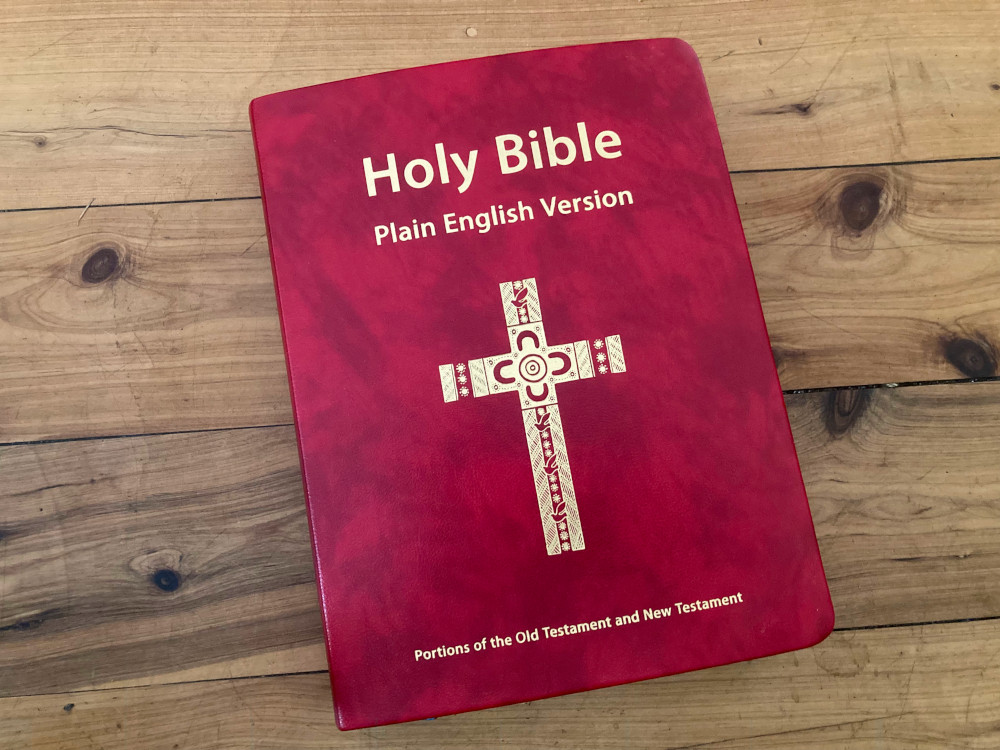A very different Bible – the Plain English Version (PEV) – is indigenous in two significant ways. It has been translated in Australia from the original languages – all other Australian English language bibles are based on translations from the UK and the United States. The PEV has been translated into a form of English that Indigenous Australians who grew up talking their own language and then later learned English will find easy to use.
“The PEV is being really well received in many First Nation Communities,” Hilton Edwards, CEO of the Bible League – which published the PEV in 2022 – told The Other Cheek.
“Bible League has more than 20 partners in the field using the PEV for ministry – we always aim to partner with the local church wherever we work; in this case, it is through organisations with evangelists and pastors in Aboriginal communities.”
Edwards updated us on how the PEV is being used. “To date, we have distributed about 2,600 copies. I have just returned from a fundraising campaign on Vision Radio where we raised funding to distribute over 3,000 more. The demand is growing as more people see it and hear about it.”
The PEV is helping evangelists in Indigenous communities. One evangelist, Laurel, had an interview on Vision Radio and shared:
“l had been purchasing Bibles. But as more people were getting saved through my street evangelising or when I witnessed in my workplace, there were times when I didn’t have the funds to purchase the number of Bibles I needed. They all wanted Bibles, so I fasted and prayed and then got a surprise text message from Hilton from Bible League Australia asking me to call him.
“Brother Hilton is an angel. I was fasting and praying for Bibles because, since COVID, a lot of people have not been interested in going to church buildings anymore. They just wanted to stay in the house. Even when I’m on the street, and people get saved, the main thing God said to me is, “Direct them to the Word”, which is the Bible. This is why I really needed Bibles.
“Amazingly, God blessed me through Hilton, who provided me with Plain English Versions of the Bible. Before long, other evangelists working in indigenous communities asked for Bibles.
“Some indigenous communities don’t have churches, so for them to have a Bible is gold. At least they’ve got a Bible, even though there’s no church there. It’s such a blessing to have the Bibles Hilton blessed us with. It’s very simple English. I gave it to some indigenous youth, and they started smiling when they were reading it because the way the Bible is written is very plain English. It’s kind of like an indigenous style of English, and one youth I gave it to said, “Wow, this really sounds like us.”
The PEV, which includes all or part of 24 books of the Bible, is published by the Bible League and translated by Wycliffe.
How to make English plain to read
Some highlights from the list modifications to English listed by the PEV team:
Linguistic features:
• Minimised passive voice. For example, Acts 16:30 NIV What must I do to be saved? becomes PEV What can I do so that God can save me?
• Minimised abstract nouns by using verbs and adjectives instead. For example, 1 Peter 1:3 NIV, A living hope through the resurrection of Jesus Christ from the dead, becomes PEV: Jesus died, but God brought him back to life. From that, we know that God will save us, too.
Rhetoric: Some of the Bible’s rhetorical features are made explicit. For example, Mark 14:27-28 NIV: “You will all fall away,” Jesus told them, “for it is written: ‘I will strike the shepherd, and the sheep will be scattered.’ But after I have risen, I will go ahead of you into Galilee.” becomes PEV: Jesus said “All you mob will run away and leave me. A long time ago, God got one of his men to write about this in his book. He wrote, ‘God will knock down the man that looks after the sheep, and all his sheep will run away.’ He wrote those words about me. I will die, like he wrote about that man, and you will all run away. But after that, God will make me alive again. Then I will go ahead of you to Galilee country, and I will wait for you there.”
Metaphors: For example, 2 Timothy 4:7 NIV: I have fought the good fight, I have finished the race, I have kept the faith. becomes PEV: I did my job properly, and I finished all the work God gave me to do. I always told the true message about Jesus. I’m like a man that runs a long race and keeps going hard right up to the finish line.
Vocab: Modified to reflect target audience usage. Instead of ‘Speak,” it has “say,” “talk,” or “tell.” “Obey” becomes “do what someone says.”
Spelling of unfamiliar names is adjusted to make it easier for the audience to sound out. “Enoch” becomes “Enok.”
The Bible League donation site is here.


Ive had a play with this bible and I’ve got a feeling PEV will become the new “Aussie English Bible” for us non-indigenous folk. Although I am concerned this is considered a translation while it reads like a very good paraphrase.
It is a translation because
1) it was translated from the original languages
2) it was translated by scholars who were committed to the original meaning